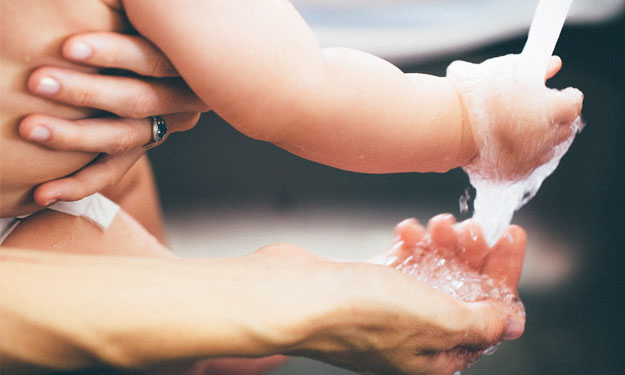How to Properly Wash Your Hands
Knowing how to properly wash your hands is essential for keeping you and your family from getting sick and staying healthy.
Washing your hands is one of the first defenses against the spread of illness and fighting germs, especially when viruses are going around.
It’s an important lesson to teach kids at a young age the importance of good handwashing skills that can help lead to and develop healthy habits in the future.
When to Wash Your Hands
Hand washing should be done many times throughout the day. This is actually something many people do not do. Unless learned at a young age many people don’t think to wash their hands after doing some tasks or chores.
Below is a list when it is most important to wash hands:
- After using the bathroom
- After blowing your nose
- If you sneeze into your hand instead of your arm, wash your hands
- After cleaning up after animals
- Before and after cooking
- After handling meat
- Before and after eating
- After taking out the trash
- After working in the yard or garden
- When hands are visibly dirty
- After changing a baby’s diaper
- After caring for a sick person
- Before and after wound dressings
- After handling paper items: money, mail, packages
- After taking public transportation
Washing Your Hands
First off, when washing your hands, you can use warm or cold water. It does not need to be hot as some people state. Hot water can burn your hands!
Second, try for soaps that are free of fragrance and are gentle.
Washing hands correctly is one of the most effective ways to keep from spreading germs. Again, it is so important to teach your kids young to wash their hands and often.
Many of us don’t wash as often as we should but again, washing your hands should be done frequently throughout the day.
- Run water from the faucet, wet hands then apply soap.
- Rub both hands together to lather soap.
- Wash fingers including nail area, in between fingers, back of hand, wash up to the wrist area.
- Wash your hands for a minimum of 20 seconds, no shortcuts.
- Put hands back under running water to rinse completely.
- Pat hands dry with paper towels or towel instead of rubbing dry. This can help your hands from getting dry.
During cold and flu season it may be a good idea to leave a towel out for each person in the house. You can purchase fun towels for each of the kids in a favorite print to help remind them which towel is theirs to use.
How to Keep Hands Moisturized
Washing hands frequently can lead to dry skin. Patting dry helps and so does a good hand cream without a lot of irritants included.
After patting dry apply a little hand cream.
If your hands have cracked, dry skin apply Vaseline and a pair of clean cotton gloves to help with cracking. This can be done while watching TV or overnight while you sleep. Check with your doctor to make sure this is a good option for you.



